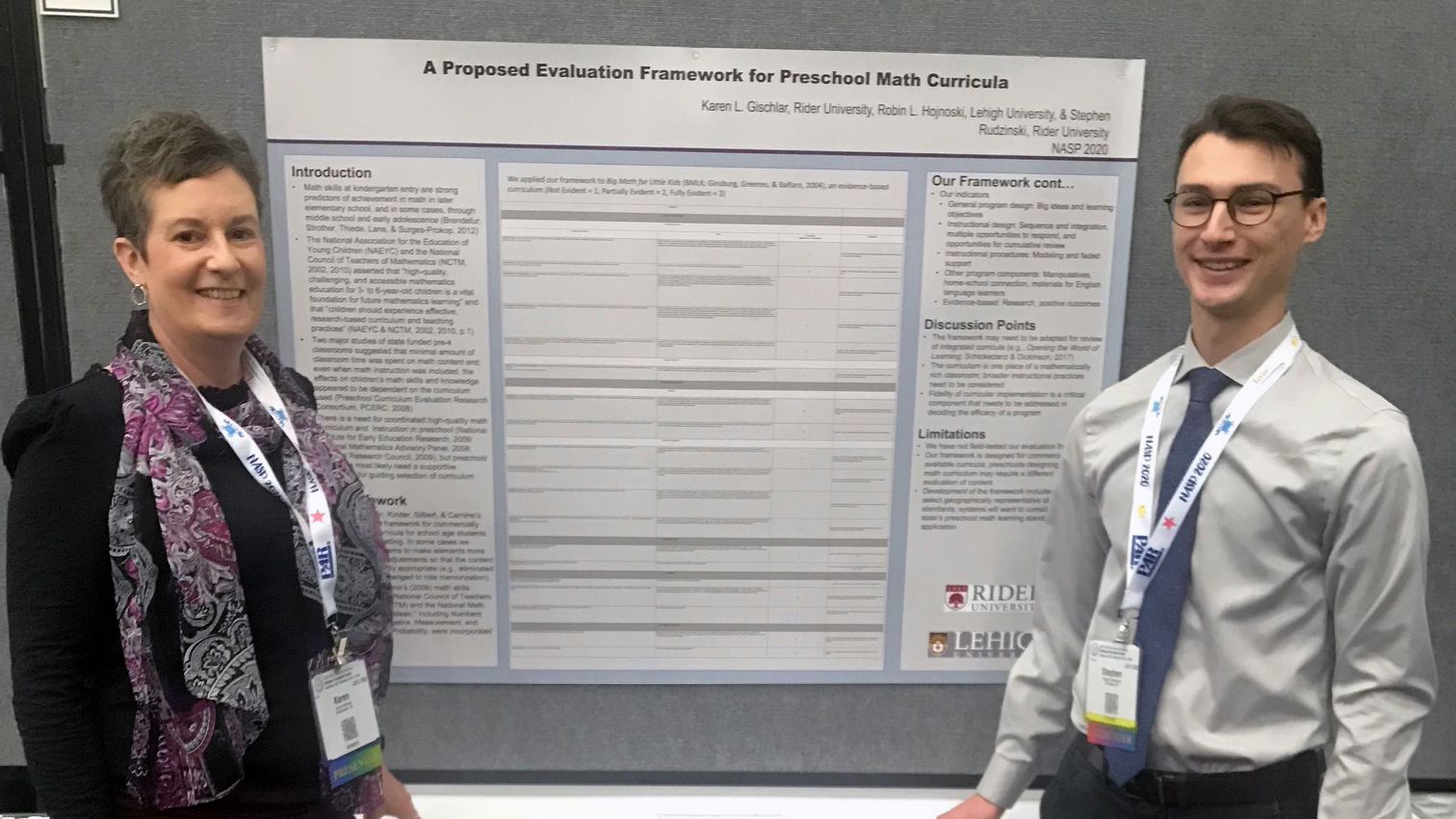Friday, Oct 9, 2020
The National Association of School Psychologists 2020 Annual Conference took place on Feb. 20 in Baltimore
by Keith Fernbach
When Stephen Rudzinski was a college senior looking to go on and earn a master’s degree, one of the key factors he considered for a graduate program was having the opportunity to conduct research. A conversation with Dr. Karen Gischlar, an associate professor in Rider University’s school psychology program, played a large role in helping him make his decision.
“I had some research experience when I was an undergraduate, and that propelled me to seek further experience in this area,” he says. “I talked to Dr. Gischlar while I was looking at graduate schools, and I got a good sense that students in the School Psychology program could seek out research opportunities if they were interested.”
Rudzinski ended up choosing Rider, and went on to serve as a graduate assistant for Gischlar. This enabled him to gain a greater perspective on the research she was conducting. “We talked a lot about projects she was working on,” he recalls.
One of the topics she mentioned was a collaboration with Dr. Robin Hojnoski from Lehigh University to create a framework for preschool mathematics curriculum review. “I have a personal interest in early childhood development, so I thought assisting her in this work would align with my goals.”
After working together on a paper for the better part of a year, Rudzinski says, “We thought it would be great to share our learnings with practicing school psychologists in one of the most influential outlets in the profession.”
They submitted a proposal to the National Association of School Psychologists (NASP) 2020 Annual Conference and ultimately were selected to lead a presentation, "A Proposed Evaluation Framework for Preschool Math Curricula," at the conference, which took place on Feb. 20 in Baltimore.
Rudzinski’s participation was supported by a grant from the Department of Graduate Education, Leadership, and Counseling through a fund that was established to help defray travel expenses for graduate students who are attending professional conferences.
Gischlar and Rudzinski say that prior research has suggested that children’s math skills when they enter kindergarten are the strongest predictors of future math achievement. Therefore, it’s very important for preschools to have a high-quality, evidence-based math curriculum to teach young learners the skills to prepare them for elementary school.
Their objective was to create a framework that could be used to evaluate preschool mathematics curricula. “It was based on an already existing evaluation framework for school-age children in grades k-8,” Rudzinski explains, “but it incorporates early developmental areas that are more specific to preschoolers, such as rote memorization instead of computation.”
The framework was broken down into six categories of evaluation criteria: General program design (including big ideas and objectives); Instructional design (things such as giving students multiple opportunities to respond and cumulative review); Instructional procedures (does the program give instructions for demonstration of concepts and methods on how errors should be corrected?); Other program components (including home-school connection and materials for English language learners); and Evidence-based (the research that went into creating the curriculum).
“With this tool, teachers will be able to review commercially-available curricula to determine which ones touch on the points that are important for early childhood development and are the most appropriate for a preschool population.”
Rudzinski says having the opportunity to present his research alongside his professor was something he will never forget. “It was definitely an amazing experience, not just the poster presentation but the entire week in Baltimore. There were so many sessions to attend, and it was so beneficial to have a chance to see all these people presenting their new research,” he says. “I’ll be able to incorporate this into what I’ve already learned.” He added, “It was a special experience to have an impact on others by sharing my work.”
Gischlar notes that she is grateful for Rudzinski’s time and dedication to the project and that she is quite proud of his presentation skills. “He spoke with colleagues and other researchers like a pro,” she says.
Looking ahead, he hopes to make this a regular part of his professional development. “It makes me want to attend even more conferences in the future just to make myself a better school psychologist. I think it’s an amazing opportunity for each and every school psychologist who goes, and I definitely see myself going back.”

